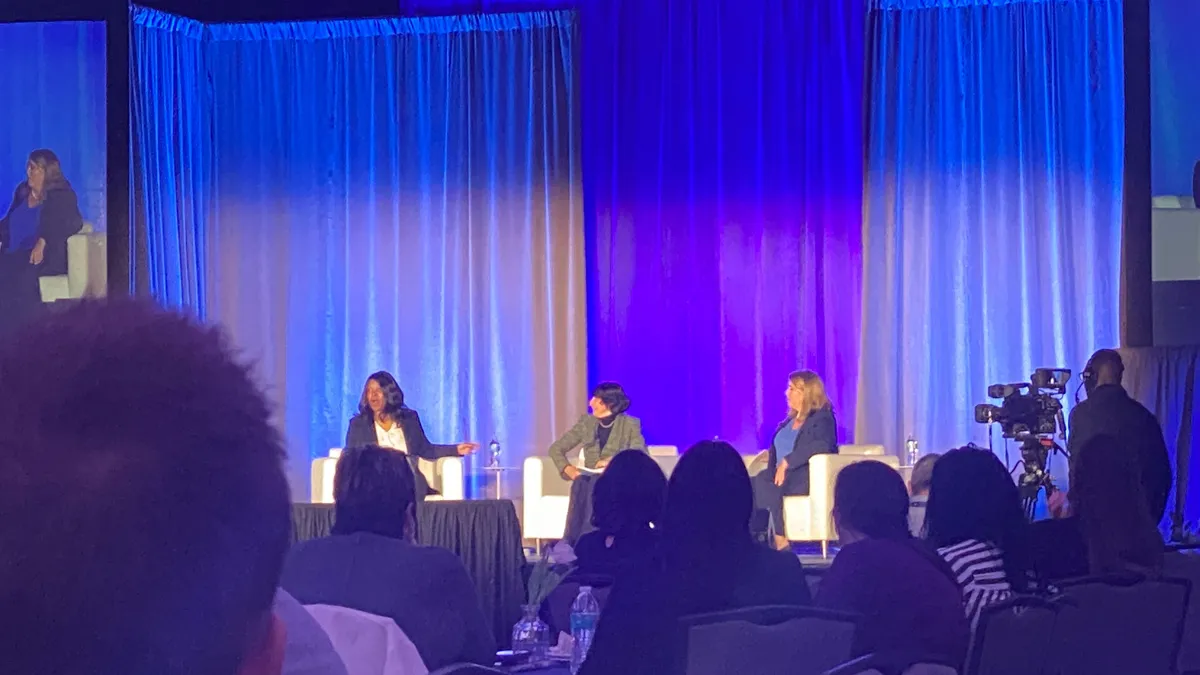UPDATE: March 6, 2025: A federal district court judge dismissed the lawsuit Wednesday at the request of both the EEOC and the plaintiff. The plaintiff did not respond to a request for comment. EEOC referred HR Dive to DOJ, and DOJ did not immediately return a request for comment.
The U.S. Equal Employment Opportunity Commission, the independent government agency tasked with enforcing federal workplace civil rights laws, allegedly discriminated against a supervisory attorney because she is Black, in violation of Title VII of the Civil Rights Act of 1964, the attorney claimed in a Feb. 8 lawsuit.
The attorney also alleged the agency violated the Americans with Disabilities Act by retaliating against her because she requested an accommodation for her mental and physical disabilities.
The EEOC referred HR Dive’s request for a comment to the U.S. Department of Justice. DOJ did not provide a response.
Per the complaint in Grider v. Lucas, the attorney, who worked at EEOC headquarters in Washington, D.C., has cataracts and seasonal affective disorder. She alleged that after she formally requested a reasonable accommodation and was allowed to “situationally telework,” her supervisor berated her and accused her of not performing her work.
She also alleged she was denied several promotions for which she was qualified, leading her to file a formal EEO complaint.
Shortly thereafter, she learned that an EEO complaint a White colleague had filed against her more than two years earlier had been resolved without her involvement and before an investigation was completed, according to the lawsuit.
Additionally, the resolution called for the White colleague to be transferred to another unit, while the attorney was required to attend a two-hour training class on improving her communication skills, the lawsuit said.
The attorney also alleged that her supervisor directed her to attend a lengthier two-day training session, but the manager who negotiated the resolution reinstated the two-hour requirement.
These actions violated Title VII, the ADA and the Rehabilitation Act of 1973, the lawsuit alleged.
Over the past few years, the EEOC has faced other employee lawsuits alleging the agency violated laws it is responsible for enforcing.
Recently, in August 2024, an EEOC enforcement manager in New Orleans sued the agency for allegedly violating Title VII by discriminating against her because she is female, Asian and of Indian national origin.
According to the lawsuit, a selecting official “groomed and promoted” a U.S.-born male subordinate with less than two years of experience to serve as the permanent field director for the office, even though the enforcement manager had been filling in as acting director and had worked for the EEOC for 24 years.
This lawsuit comes amid a radical shakeup at the EEOC. Shortly after President Donald Trump was inaugurated, in an unprecedented move, he fired two Democratic commissioners, former Chair Charlotte Burrows and Commissioner Jocelyn Samuels, as well as Democratic General Counsel Karla Gilbride, before their appointed terms ended.
The following day, Acting Chair Andrea Lucas, the named defendant in this case, announced the EEOC was rolling back protections against gender identity discrimination pursuant to a White House executive order.
Here, the attorney alleged that in 2021, she criticized the White colleague over a training program the colleague had developed for the public. The attorney said she told the colleague the program would be offensive to Black audiences because it gave the perception that Black men could not be trusted. The colleague denied anything was wrong.
Subsequently, in an email, the attorney faulted the colleague for submitting a “poorly prepared work product” and for having “a complete lack of cultural humility.” In response, the colleague filed an EEO race discrimination complaint against the attorney, according to the lawsuit.
The January 2024 resolution “punished [a Black employee] for opposing an unlawful EEOC practice while [a White employee] was rewarded,” the lawsuit alleged.













